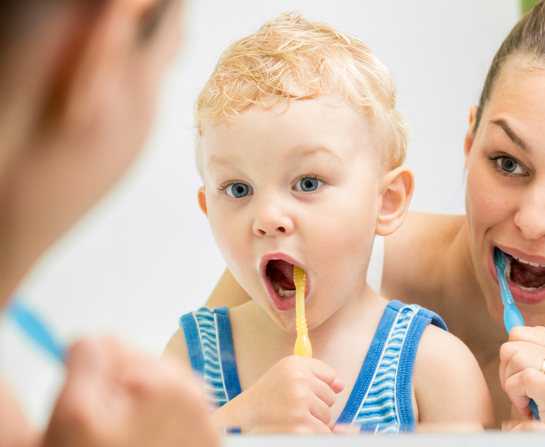Start from Young, Good for Life
May 7, 2022 Return


Dr Rohaida Abdul Halim Lecturer/Paediatric Dentistry Specialist, Faculty of Dentistry, University Teknologi MARA
Just like all good habits, good eating habits and oral hygiene – such as daily cleaning of the mouth and teeth – should be taught to children from a young age. The earlier they start, the more likely they will adopt these good habits for life.
Before your child’s teeth arrive
You should clean your child’s mouth regularly even before his teeth erupt. This helps to create a clean environment for the primary teeth to emerge into. You can start during the first few days after birth; this will get you and your child into the habit of keeping the mouth clean.
- Lay your baby on a comfortable place (such as on your lap). Make sure that you can see clearly into your baby’s mouth.
- Use a soft baby brush or a clean damp washcloth wrapped around your finger to gently wipe all parts of your baby’s gums. Do not use toothpaste until your child has his teeth.
After your child has his first tooth
Now that your child has his teeth, you can use baby toothpaste to clean his teeth.
- When your child is under three years old, apply just a smear of toothpaste on either a dry toothbrush or one moistened only with water.
- When your child is three to six years old, the amount of toothpaste can be increased to a pea-sized portion.
Brushing steps
- Hold the toothbrush at a 45-degree angle to the teeth. Point the bristles to where the gums and the teeth meet.
- Using gentle circular motions (do not scrub), clean every surface of the tooth. For the front teeth, use the front part of the toothbrush to brush it. Do not brush too hard because this can hurt the gums.
A note on children’s toothbrush and toothpaste
- The best kind of toothbrush for children is the soft kind, with rounded bristles. The toothbrush should be able to fit your child’s mouth properly.
- Toothbrushes should be changed either every three to four months or when the bristles are bent and worn down (whichever comes first). Bent or worn down bristles not only will not clean your child’s teeth properly, they may end up hurting the gums.
- Pick toothpaste containing 1,000 ppm (parts per million) fluoride. You can read information given on the box to make sure that you are buying the right toothpaste.
Your child should be able to brush his own teeth once he can write his own name.
- However, you should still check to make sure that he is doing it correctly. Children under six should always be supervised when brushing their teeth.
- Always make sure your child spit out the excess toothpaste after brushing. Excessive swallowing of toothpaste by young children may result in dental fluorosis. This condition causes the enamel (the outer layer of the tooth) to show white spots and, in severe cases, brown stains, pitting, or mottling.
How often to brush?
Children should brush their teeth twice a day, especially right before bed (after the last meal/drink). The last is important because, when the child is asleep, less saliva or spit is produced in the mouth to clean and protect the teeth. As a result, there is a higher risk of cavities or tooth decay when a child does not brush his teeth before bedtime.
Don’t forget the check-up
The Oral Health Division, Ministry of Health Malaysia, recommends that a child should have his first dental visit before the first or second birthday.
In addition to checking for tooth decay and other problems, the dentist will teach the parents proper techniques to clean the child’s mouth as well as evaluate for any negative habits such as thumb-sucking. This is also important in building a lifetime of good dental habits.
When it comes to dental problems, it is better to catch them early and fix them before they become worse. Therefore, you should bring your child to a dentist every six months. On top of finding out whether the cleaning done at home is working or not, these visits will let the child learn the importance of going to the dentist to prevent dental problems.
If you like this article, do subscribe here.

